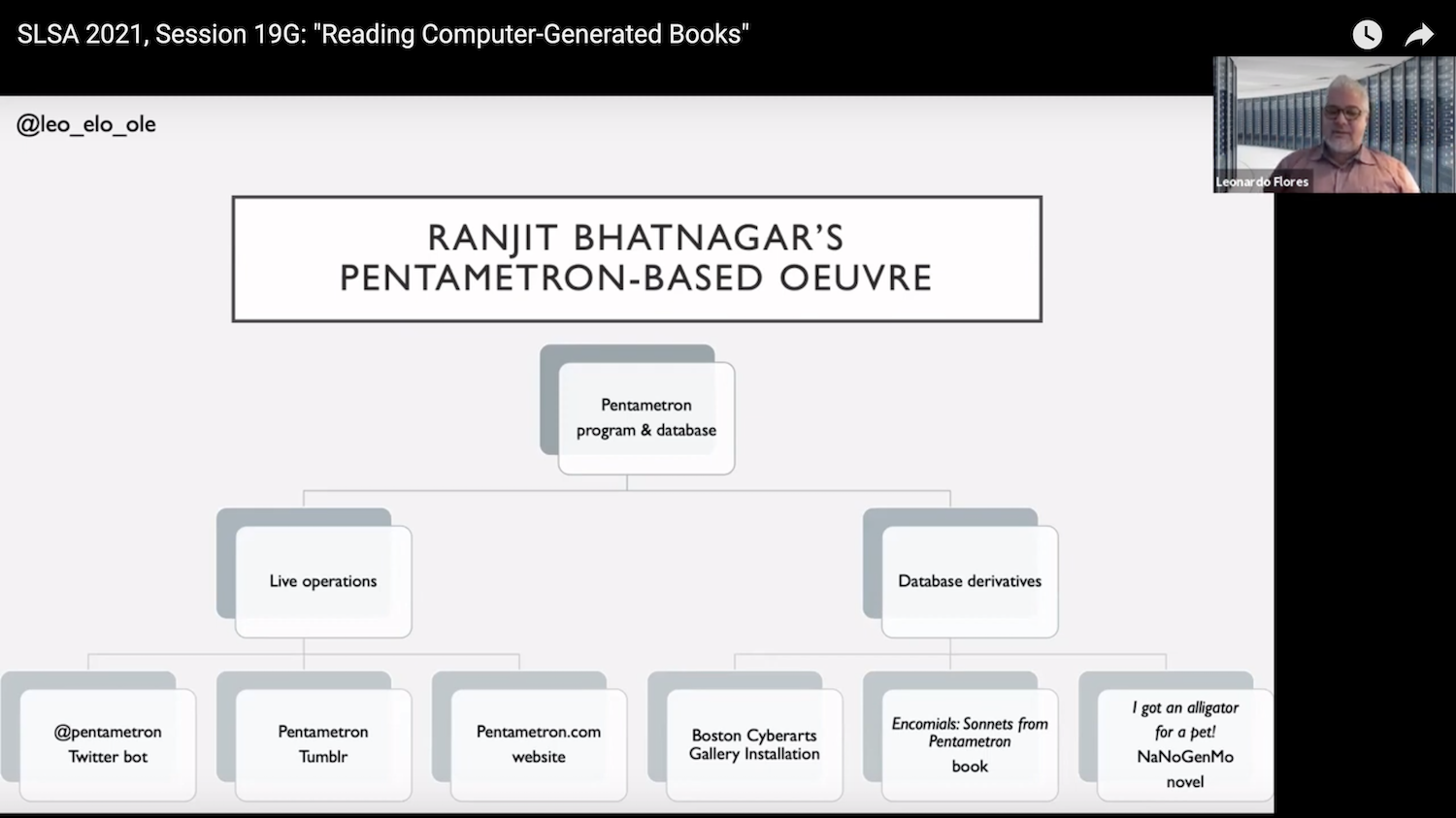On October 2, I participated in a panel titled “Reading Computer-Generated Books” for SLSA 34 (Society for Literature, Science, and the Arts). The abstract and video are available below:
Computational literature — including bookbound and bookish digital artifacts — are some of the earliest forms of electronic literature and represent a contemporary thread of practice in print-on-demand and small press imprints publishing computer-generated literature. Authors continue to find new audiences and contexts for computational literature. Books are an interface that invites situated reading practices and evokes aesthetics connected to literary genres developed for the print tradition. Reading on screens also creates different expectations and practices, and digital ephemerality has long been considered both a key characteristic and perennial problem for electronic literature. Signifiers flicker on screens, but computational literature can also find form in the durable specificity of print and near-print artifacts. The aim of this panel is to bring more scholarly focus to bear on literature with programmatic origins that does not depend on an electronic screen as its interface. This panel will present four case studies of computational literature ranging from 1677 to the present that will unpack some of the motivations behind producing literary texts using algorithms and some of the interest in reading computational literature in print.
Leah Henrickson will examine the social contexts for John Peter’s Artificial Versifying (1677), a system for codifying algorithms for generating verse, and the technological hype that drove its reception.
James Ryan will present an account of Svensk Namnbok 1964 (1964), a book of computer-generated surnames commissioned by the Swedish government in the early 1960s to address a national crisis in the lack of surname variety. This, along with the case of a 1957 Pfizer book of computer-generated drug names, shows the power of computational literature as an (oftentimes practical) aid to creativity.
Zach Whalen will offer a close reading of Energy Crisis Poems (1974), a small collection of poetry generated on an IBM S370/158 computer at the Standard Oil Data Center by the Cleveland-based poet, r.j.s. (Robert J. Sigmund) in 1974, offering a fitting counterpoint to the energy-intensive processing used in training contemporary AI engines used for text generation.
Leonardo Flores will examine Ranjit Bhatnagar’s Encomials: Sonnets from Pentametron (2018) from the perspective of three waves of digital literature, examining the platforms they use, the audiences they cultivate, and the reading experiences they encourage. Focusing on print-bound computational literature offers an opportunity to consider specific audiences, social contexts, and medially-specific interventions for creative computing.
By examining related works across distant time periods, contemporary aesthetic practices and concepts around computational literature come into sharper view, and the closely-themed papers assembled into this panel represent an emerging field of interest in the study of digital literature.
Abstract for “Reading Computer-Generated Books” panel.
My paper (which starts at 1:09:11) offers a detailed exploration of Ranjit Bhatnagar’s Pentametron and its many outputs: a Twitter bot, Twitter account, Web page, digital and print books, and a gallery installation.
More importantly, I recommend watching the whole panel, which examines a 17th century book of generative poetry, a computational approach to name generation in Sweden, and a book of computer generated poetry from the 1970s. Collectively we offer a deep dive into cultural and material instantiations of generative writing practices.
Share and enjoy!
